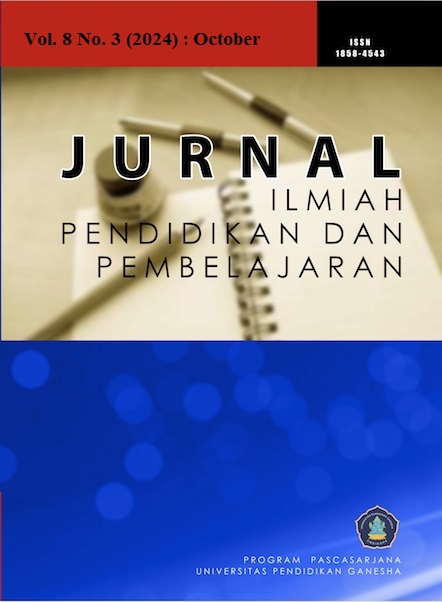Implementing the Independent Learning Curriculum on Student Learning Motivation in Fashoin Dependent Classes
DOI:
https://doi.org/10.23887/jipp.v8i3.86479Keywords:
Independent Curriculum, Learning, MotivationAbstract
In the world of education, the curriculum has an important role in determining the direction and quality of learning experienced by students. The implementation of an independent learning curriculum designed to increase student involvement and responsibility in the learning process. This research is ex-post facto research with a quantitative type of research. This research aims to determine the description of the implementation of the Independent Learning Curriculum in the Fashion Department and the Learning Motivation of Students in the Fashion Department. This type of research is ex-po facto. The population in this study were class X and XI students majoring in fashion design. The sampling technique uses a population sample method where if the population is less than 100 then the entire population becomes the sample, namely a sample size of 50 students. The data collection techniques used are observation, documentation and questionnaires. The analysis techniques used are descriptive statistical analysis and inferential analysis. The results of the research show a picture of the implementation of the independent learning curriculum majoring in fashion design with a percentage of 34% or 17 students who produced an interval of 40-43 which was categorized as moderate; and Description of the learning motivation of students majoring in fashion design with a percentage of 32% or 16 students who produced the highest interval of 43-46 which was in the high category. If the implementation of an independent learning curriculum is proven to be effective in increasing motivation, the implication for the world of education is that there will be a push to implement a more flexible and adaptive approach in various practice-oriented classes.
References
Aini, N. N., & Wening, S. (2019). Korelasi Hasil Belajar Produktif Dengan Percaya Diri Berwirausaha Busana Siswa Tata Busana Smk N 1 Ngawen. Jurnal Fesyen: Pendidikan Dan …, 2(3), 0–8. Https://Journal.Student.Uny.Ac.Id/Index.Php/Busana/Article/View/15284.
Ambaryanti, A., Retnaningdyastuti, R., & Roshayanti, F. (2020). Pengaruh Keterampilan Dalam Ict Dan Etos Kerja Terhadap Tpack Guru Sd Di Kecamatan Tengaran Kabupaten Semarang. Jurnal Manajemen Pendidikan (Jmp), 9(1), 94–112. Https://Doi.Org/10.26877/Jmp.V9i1.6838.
Andayani, E., Agustina, R., Rulita Nurfaizana, D., & Sya’roni, I. (2023). Media Vocationalogy Mata Pelajaran Produk Kreatif Dan Kewirausahaan (Pkk): Hasil Belajar Siswa Smk Di Kabupaten Malang. Jurnal Riset Pendidikan Ekonomi, 8(2), 220–229. Https://Doi.Org/10.21067/Jrpe.V8i2.9110.
Beno, J., Silen, A. ., & Yanti, M. (2022). Ketrampilan Fasion. Braz Dent J., 33(1), 1–12.
Bestari, A. G., & Ishartiwi, I. (2016). Pengaruh Penggunaan Media Mood Board Terhadap Pengetahuan Desain Busana Pada Mahasiswa Pendidikan Teknik Busana. Jurnal Inovasi Teknologi Pendidikan, 3(2), 121. Https://Doi.Org/10.21831/Jitp.V3i2.8006.
Fabiana Meijon Fadul. (2019). Jurnal Kependudukan Islam. Pengaruh Motivasi Belajar Dan Kreativitas Belajar Terhadap Prestasi Belajar Siswa Pada Mata Pelajaran Pendidikan Agama Islam Di Madrasah Aliyah Negeri Se-Kota Pekanbaru, 7(1), 18–34.
Gaya, P., Guru, M., Lingkungan, D. A. N., Remaja, P., Motivasi, T., Mata, S., Ekonomi, P., Siswa, P., Rakhmawati, T., Keguruan, F., Ilmu, D. A. N., & Maret, U. S. (2012). Triana Rakhmawati_K7408281. 3(3), 45.
Haerullah, H., & Elihami, E. (2021). Formal Dan Nonfomal. Jurnal Edukasi Nonformal, 2(2), 1 1.
Indrata, Y. J. N. W. S. R. A. (2022). Relevansi Kurikulum Merdeka Belajar Dengan Model Pembelajaran Abad 21 Dalam Perkembangan Era Society5.0. Jurnal Ilmu Pendidikan.
Jaidun Turnip Dan Keysar Panjaitan. (2014). Penerapan Model Quantum Learning Untuk Meningkatkan …. Teknologi Pendidikan, 7(2), 18–23. Https://Www.Google.Co.Id/Url?Sa=T&Rct=J&Q=&Esrc=S&Source=Web&Cd=1&Cad=Rja&Uact=8&Ved=0ahukewib_-Wmoc7vahugr48khfu7dtqqfggumaa&Url=Http%3a%2f%2fdownload.Portalgaruda.Org%2farticle.Php%3farticle%3d281776%26val%3d5593%26title%3dpenerapan%2520model%2520quantu
Khasanah, U., & Prasetyaningtyas, W. (2022). Pengaruh Motivasi Ekstrinsik Terhadap Keaktifan Belajar .Siswa Program Keahlian Tata Busana Mata Pelajaran Membuat Pola Di Smk Negeri 1 Plupuh. Ffej (Fashion And Fashion Education Journal), 11(1), 15–19. Https://Journal.Unnes.Ac.Id/Sju/Index.Php/Ffe/Index.
Khaurulrijal., F. S. M. A. G. M. T. F. S. (2020). No Title (P. 38).
Marisam. (2019). Inivasi Kurikulum Merdeka Belajar Di Era Society 5.0. Jurnal Sejarah, Pendidikan, Humaniora, 4(3), 5 1.
Masni, H. (2015). Strategi Meningkatkan Motivasi Belajar Mahasiswa. Dikdaya, 3(4), 5 1.
Novianti, N. (2020). Korntribusi Pengelolaan Laboratorium Dan Motivasi Belajar Siswa Terhadap Efektifitas Proses Pembelajaran. Jurnal Pendidikan, Edisi Khusus, 3(4), 1.
Oktapian, A. (2021). Pengaruh Hasil Belajar Mata Pelajaran Produktif Dan Partisipasi Ekstrakulikuler Terhadap Kesiapan Berwirausaha Siswa Kelas Xii Smk Negeri 6 Malang. Jurnal Teknik Mesin Dan Pembelajaran, 4(1), 1. Https://Doi.Org/10.17977/Um054v4i1p1-10.
Penerapan, P., Saintifik, P., Guru, K., Motivasi, T., & Siswa, B. (2017). Malang Desember 2017. 3(3), 2019.
Restu Rahayu., R. S. S. R. N. H. (2021). Jurnal Besicedu. Jurnal Besicedu, 2(3), 5 4.
Siswanti, L., Tobari, & Puspita, Y. (2020). Pengaruh Penerapan Metode Tutor Sebaya Dan Motivasi Terhadap Hasil Belajar Siswa. Jurnal Pendidikan Tambusai, 4(1), 1796–1797. Https://Jptam.Org/Index.Php/Jptam/Article/View/650/573.
Downloads
Published
How to Cite
Issue
Section
License
Copyright (c) 2024 Rika Riwayani, Hamidah Suryani, Nur Wulan

This work is licensed under a Creative Commons Attribution-ShareAlike 4.0 International License.
Authors who publish with the Jurnal Ilmiah Pendidikan dan Pembelajaran (JIPP) agree to the following terms:
- Authors retain copyright and grant the journal the right of first publication with the work simultaneously licensed under a Creative Commons Attribution License (CC BY-SA 4.0) that allows others to share the work with an acknowledgment of the work's authorship and initial publication in this journal.
- Authors are able to enter into separate, additional contractual arrangements for the non-exclusive distribution of the journal's published version of the work (e.g., post it to an institutional repository or publish it in a book), with an acknowledgment of its initial publication in this journal.
- Authors are permitted and encouraged to post their work online (e.g., in institutional repositories or on their website) prior to and during the submission process, as it can lead to productive exchanges, as well as earlier and greater citation of published work. (See The Effect of Open Access)










